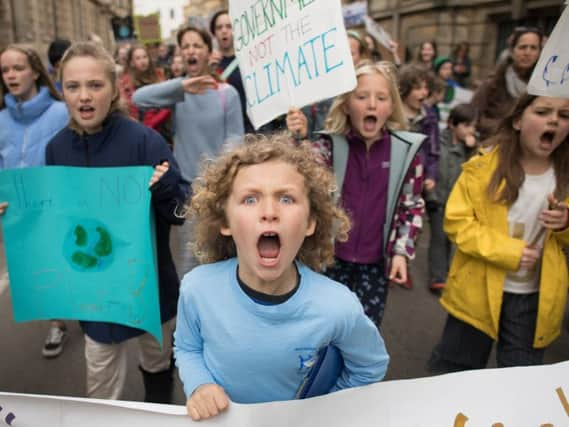Investing in fight against climate change is good business, new study finds


Researchers from around the world are now calling on world leaders to accelerate efforts to tackle climate change and said "it is a matter of life and death for people everywhere."
They urged world leaders to accelerate their efforts and said reducing the magnitude of climate change is also a good investment.
Advertisement
Hide AdAdvertisement
Hide AdCalls for investment are even more compelling given the wealth of evidence that the impacts of climate change are happening faster and more extensively than projected, even just a few years ago.
Study lead author Professor Ove Hoegh-Guldberg, of the University of Queensland in Australia, said: "Almost every aspect of the planet's environment and ecology is undergoing changes in response to climate change, some of which will be profound if not catastrophic in the future.
"Acting on climate change has a good return on investment when one considers the damages avoided by acting."
It comes after a recent United Nations report projected that as many as a million species may be at risk of extinction over the coming decades and centuries.
Prof Hoegh-Guldberg said. "First, has we have underestimated the sensitivity of natural and human systems to climate change, and the speed at which these changes are happening.
"Second, we have under appreciated the synergistic nature of climate threats - with the outcomes tending to be worse than the sum of the parts.
"This is resulting is rapid and comprehensive climate impacts, with growing damage to people, ecosystems, and livelihoods. For example, sea-level rise can lead to higher water levels during storm events. This can create more damage.
"For deprived areas, this may exacerbate poverty creating further disadvantage.
Advertisement
Hide AdAdvertisement
Hide Ad"Each risk may be small on its own, but a small change in a number of risks can lead to large impacts."
Co-author Professor Daniela Jacob, director of Climate Services Centre in Germany, raised concerns about these rapid changes - unprecedented weather extremes in particular.
He said: "We are already in new territory.
"The 'novelty' of the weather is making our ability to forecast and respond to weather-related phenomena very difficult.
"These changes are having major consequences."
The study updated a database of climate-related changes and found that there are significant benefits from avoiding 2 degrees Celcius and aiming to restrict the increase to 1.5 degrees Celcius above pre-industrial global temperatures.
Researchers assessed projections of risk for forests, biodiversity, food, crops and other critical systems, and found very significant benefits for limiting global warming to 1.5 degrees Celcius rather than 2 degrees Celcius.
Study author Professor Rachel Warren, from the University of East Anglia, said: "The scientific community has quantified these risks in order to inform policy makers about the benefits of avoiding them."
Since the Paris Agreement came into force, there has been a race to quantify the benefits of limiting warming to 1.5 degrees Celcius so that policy makers have the best possible information for developing the policy required for doing it.
Prof Warren added: "If such policy is not implemented, we will continue on the current upward trajectory of burning fossil fuels and continuing deforestation, which will expand the already large-scale degradation of ecosystems.
Advertisement
Hide AdAdvertisement
Hide Ad"To be honest, the overall picture is very grim unless we act.
"Climate change is not the only factor but is one of the most important ones."
The urgency of responding to climate change is at front of researchers' minds.
Professor Michael Taylor, co-author and dean of science at the University of the West Indies, said: "This is not an academic issue, it is a matter of life and death for people everywhere."
Prof Hoegh-Guldberg reiterated the importance of 2020 in terms of climate action and the opportunity to strengthen emission reduction pledges in line with the Paris Agreement of 2015.
He said: "Current emission reduction commitments are inadequate and risk throwing many nations into chaos and harm, with a particular vulnerability of poor peoples.
"To avoid this, we must accelerate action and tighten emission reduction targets so that they fall in line with the Paris Agreement.
"As we show, this is much less costly than suffering the impacts of 2 degrees Celcius or more of climate change."
He added: "Tackling climate change is a tall order.
"However, there is no alternative from the perspective of human well-being - and too much at stake not to act urgently on this issue."
The study was published in the journal Science.
